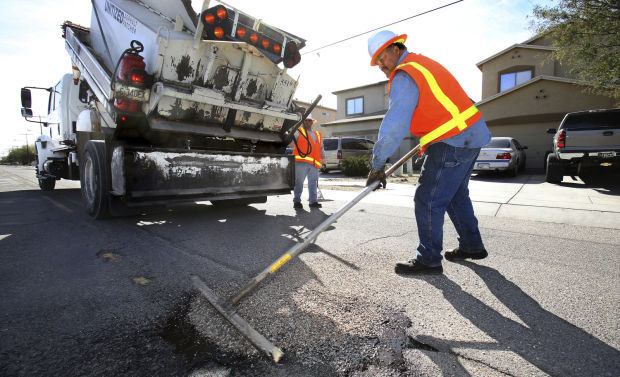The city of Tucson wants to put another $100 million into city streets over the next five years, and the Tucson City Council is again asking area residents to pay for it.
However, unlike the voter-approved Proposition 409 that asked voters to approve $100 million in bonds — which is debt sold by the city — this new proposal will raise $20 million a year dedicated to roads with a half-cent sales-tax increase.
The tax increase, if approved by voters, is expected to raise $50 million annually. The council has dedicated the remaining $30 million for capital infrastructure improvements for the Police and Fire departments.
In the years since the city starting rebuilding roads with Prop. 409 money, officials have grown confident they have demonstrated that they can fix streets as promised and under budget.
“We’ve proven that already, that we can spend $20 million a year pretty effectively,” said Daryl Cole, the city’s transportation director.
Last year, the council expanded the number of streets it was able to repair using Prop. 409 money after projects came in well under expectations cost-wise.
“We anticipated a lot of reconstruction (of existing roads,)” Cole explained, noting several projects were done for less than anticipated. Lower fuel prices also helped cut costs, he said.
“It was pushing $3-plus a gallon for fuel and we were picturing it going to $4,” Cole said.
Lower crude oil prices also helped lower the cost of materials used in asphalt.
Under Prop. 409, city officials focused primarily on two tiers of projects — streets in poor shape needing significant and costly rebuilds, and roads in a fairly good condition that needed inexpensive chemical sealing work to extend their useful life.
Cole explains it is simply easier to keep roads in good condition with routine maintenance, rather than trying to fixing them years later.
The city, he said, simply couldn’t keep up with its maintenance during the height of the recession.
If voters approve the half-cent sales tax, the council will make some changes to how it handles Prop. 409 funds.
This includes adding maintenance to some city streets that were rebuilt under the bond program.
“The amount of money spent on maintenance is pretty small,” Cole said, estimating it would amount to a fraction of the overall $100 million budget set aside for roads.
The council, however, also opted to put more money into both main roads and collector streets, lower-capacity roads that move traffic from local streets to main roads.
And unlike Prop. 409, which spent only 15 percent to fix neighborhood streets, the new proposal would spend 40 percent fixing roads in Tucson neighborhoods.
The City Council eventually opted in the proposal to end the sales-tax increase after five years, despite acknowledging the revenues raised in that period will fall short of the identified needs in each area.
As the city moves forward with the plan that could put an additional $100 million into local streets, Cole admits the decisions made by staff can be puzzling to the average person who is simply weary from driving on crumbling streets.
Some road construction, for example, is postponed in order to coincide with plans from other agencies.
The Regional Transportation Authority, as well as utilities like Tucson Electric Power and Southwest Gas, can delay the timeline for street repairs.
Michael Graham, a spokesman for the city transportation department, points to East Broadway near Camino Seco as an example.
The city repaved what he calls a “horseshoe” along portions of Broadway, Pantano and Speedway. But the work stopped at an intersection east of the area.
He gets calls about why crews stopped, explaining that the intersection already was going to be rebuilt by the RTA when it widens the roads in a few years.
“It wouldn’t have been a good use of taxpayer money,” he said.
The council will meet in early January to sign off on the specifics of the ballot language, outlining how the anticipated $250 million in the overall plan will be spent over the five-year period.





